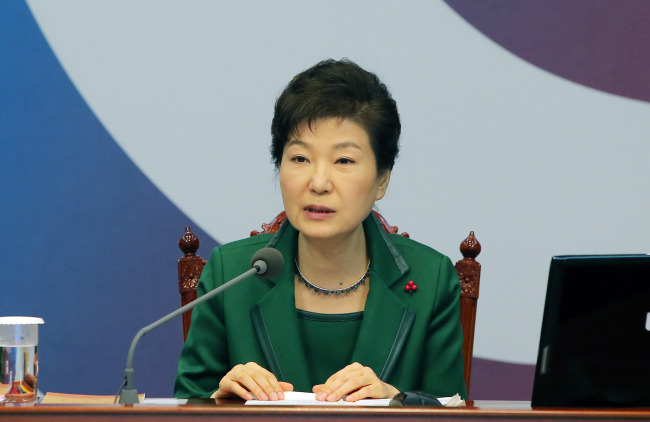President Park Geun-hye on Tuesday continued to add pressure on lawmakers to pass key bills related to government-led reforms in business, labor and education sectors, stressing that the college reform bill is critical to “enhancing competence in higher education” eventually raising youth employment.
Speaking at the last Cabinet meeting of 2015, the South Korean leader also warned that the failure to carry out the reform may result in South Korea‘s sovereign credit rating being downgraded. Park said that the global rating agency Moody’s recent upgrade of the country’s rating reflected their anticipation of the reform and was “simultaneously a warning that a failure to reform could result in subsequent ratings downgrade.”
Speaking at the last Cabinet meeting of 2015, the South Korean leader also warned that the failure to carry out the reform may result in South Korea‘s sovereign credit rating being downgraded. Park said that the global rating agency Moody’s recent upgrade of the country’s rating reflected their anticipation of the reform and was “simultaneously a warning that a failure to reform could result in subsequent ratings downgrade.”

“The college reform is to preemptively react to the decreasing number of students, and to increase the overall quality of higher education,” she said. “Only with this bill can we induce colleges to reduce the number of seats or voluntarily shut down.”
The Education Ministry forecasts the college openings will surpass the number of high school graduates by 160,000 by 2024. It plans to cut the number of openings by conducting a nationwide evaluation and forcing underperforming colleges to downsize, cut subsidies, change functions, or even shut down.
But the ministry is unable to forcibly carry out the measures ― except cutting subsidies ― as the bill has not yet been passed by parliament.
Park noted the job market mismatch that last year’s Labor Ministry report had forecast for the next 10 years, wherein college graduates were expected to exceed the number of job openings by 790,00 from 2014-2024.
The ministry recently rolled out a plan to pump 270 billion won ($230 million) into colleges that restructure their departments to “foster talent that meets the needs of the society,” namely by downsizing departments with low employment rates and expanding departments that boast high recruitment rates for their graduates.
“If the current size and structure of colleges persist, the job mismatch will worsen. Management, business and teaching majors will be oversupplied while there will be a shortage of engineering and medical majors,” she said. “Neglecting this situation is sure to worsen the youth unemployment issue, which is the biggest problem facing our society.”
The president once again pressed the lawmakers to reach an agreement on bills for government-led labor reforms. The five-point labor law revision is related to thorny issues such as expanding the scope of dispatched workers, extending the maximum period of temporary workers and adopting the wage peak system.
The government said that the reform will improve labor conditions ― such as the wage peak system allowing more new jobs for the youth ― but labor unions and the opposition have raised doubts that it will prolong the nonguaranteed period for workers and allow business to dismiss workers more easily.
“If the labor reform gets underway, it will create 370,000 new jobs in the next 5 years while also improving the low birthrate and slumping domestic consumption,” she said. Park linked the low birthrate to youth unemployment, saying that the older generation should “concede” to the younger generation.
The president’s rhetoric on Tuesday had softened considerably from her verbal attack in the parliament earlier this month ― particularly against the main opposition New Politics Alliance for Democracy ― when she accused it of being “a proxy for the privileged” and said failure to complete the labor market reform would “face public disappointment and anger.”
Park had also said the lawmakers should pass the antiterrorist law, which too is pending at the National Assembly. The NPAD had been opposing the law’s passage on grounds that it will give excessive rights to the National Intelligence Service to spy on people.
By Yoon Min-sik
(minsikyoon@heraldcorp.com)




















